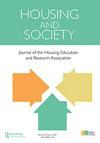Average annual wind loss libraries to support resilient housing and community decision-making
Q2 Social Sciences
引用次数: 6
Abstract
ABSTRACT One of the key components to increase the resiliency of communities from wind hazards is enhancing individuals` and homeowner’s resilience continuously during and after a storm. A variety of wind hazard risk assessment methodologies are available; however, in spite of advances in damage and loss modeling, the systematic development of loss libraries has been largely overlooked in scholarly literature. This paper develops a straightforward, matrix-based mathematical formulation to rapidly generate a library of average annual loss (AAL) data for multiple building types across a variable wind hazard domain through convolution of hazard and loss functions and Monte Carlo simulation. The methodology is implemented for wind loss functions included in FEMA’s HAZUS-MH Hurricane Model to develop building, contents, loss of use, and total AAL loss libraries for 160 variations of wood-framed, single-family, one-story homes located in the continental US. The developed methodology provides a practical, easy-to-use approach for wind hazards that can be implemented immediately for a variety of applications to support individual building- and community-level wind hazard risk reduction decision-making.平均年风损失图书馆,支持弹性住房和社区决策
摘要提高社区抵御风力灾害的能力的关键组成部分之一是在风暴期间和之后不断提高个人和房主的抵御能力。有多种风危害风险评估方法;然而,尽管损失和损失建模取得了进展,但损失图书馆的系统发展在学术文献中却被忽视了。本文开发了一个简单的、基于矩阵的数学公式,通过风险和损失函数的卷积和蒙特卡罗模拟,快速生成可变风危害域内多种建筑类型的平均年损失(AAL)数据库。该方法适用于FEMA的HAZUS-MH飓风模型中包含的风损失函数,为位于美国大陆的160种木框架独栋单层住宅开发建筑、内容物、使用损失和AAL总损失库,易于使用的风危害方法,可立即用于各种应用程序,以支持单个建筑和社区级别的风危害风险降低决策。
本文章由计算机程序翻译,如有差异,请以英文原文为准。
求助全文
约1分钟内获得全文
求助全文
来源期刊

Housing and Society
Social Sciences-Urban Studies
CiteScore
2.30
自引率
0.00%
发文量
10
期刊介绍:
Housing and Society is the journal of the Housing Education and Research Association (HERA). The journal supports the mission of HERA by providing for the dissemination of research and other scholarly work. Submissions from a broad range of perspectives are encouraged. Topics in housing include: policy, design, social aspects, gerontology, behavioral aspects, energy/environment, equipment, interiors, economics, theory/model development, education, and program development or evaluation. The journal welcomes the submission of original research articles, notes and commentaries. Notes are shorter manuscripts presenting succinct information on housing related to one of the following categories: - Research: exploratory or not heavily theory-based or statistically analyzed - Academic: innovative teaching ideas - Program: development, implementation, and/or evaluation of Cooperative Extension or other housing programming efforts - Policy: examination of policy impact, comparative analysis, and/or need to achieve housing goals - Reviews: books, documentaries, etc.
 求助内容:
求助内容: 应助结果提醒方式:
应助结果提醒方式:


